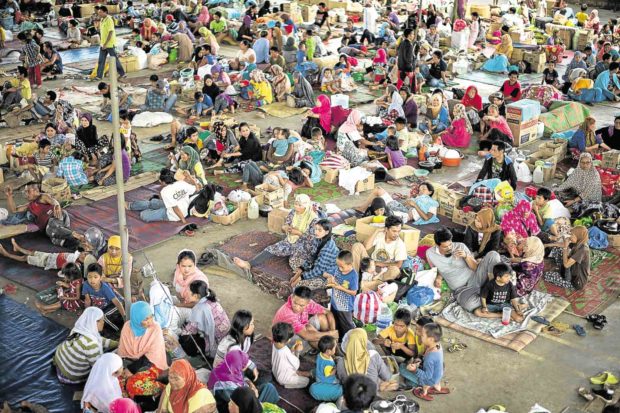Business alive in poor Lanao town as Marawi crisis drags

Evacuees from Marawi City find safety in the town of Saguiaran in Lanao del Sur province, away from the fighting raging in their city since last month. —AFP
SAGUIARAN, Lanao del Sur—This sleepy town of 24,619 people suddenly came to life as hundreds of people from Marawi City, some 10 kilometers away, started arriving on May 23 as they fled the fighting between government troops and terror groups who attacked the Lanao del Sur provincial capital.
But along with the influx of evacuees, local businessmen found opportunities in the crisis as they saw their income doubling.
Kaina Malik Nasser, a resident of Barangay Mapantao here, said her stock of smoked fish would sell faster than before.
“On Monday alone, I sold P5,000 worth of fish (‘bakas’ in the local dialect),” she said, adding that she would earn even if there were dozens of other smoked fish vendors lining the kilometer-long stretch of road fronting the town hall. This area serves as Saguiaran’s public market.
Nasser said she could not have sold the same volume before the fighting in Marawi started.
Article continues after this advertisementBut vendors like her, she said, did not take advantage of the situation.
Article continues after this advertisement“Our price really depended on the price we pay from our sources. But so far, bakas is still being sold at P380 apiece,” she said. Bakas is a term given to smoked juvenile tuna that weighs around 2 or more kilograms each.
“We’re happy to make double than what we earned before. There is no need to raise prices,” she said.
Omayra Rosbel, a fruit vendor, said while they were sad that sections of Marawi had been destroyed, the flood of evacuees reaching their town helped small traders like her.
Rosbel said she now makes a minimum of P300 a day from selling fruits.
“Many people also found selling fruits profitable so they started their own businesses,” she said.
Rosbel and Nasser said food items sell fast these days.
“Evacuees still have money to spend and many of them [preferred fresh] food than those being distributed by relief groups,” Nasser said.
Among those who cashed in on the demand for fresh food were Haini Sarip and her family members. Sarip is an evacuee from the village of Lilod Saduc in Marawi City.
Pooling the money she and her siblings had, Sarip started a fish and poultry meat business just a stone’s throw away from the evacuation center in front of the town hall here.
“We sell chicken at P150 a kilogram, almost the same price you pay when you buy it elsewhere,” she said, stressing that she and her siblings did not take advantage of the situation of evacuees.
Sarip said she and her siblings decided to start the business three days after they arrived here and sought refuge in their relatives’ homes.
“It’s difficult to rely on relief assistance. The line gets longer by the day. It’s better we earn money so we could buy fresh food for the family,” she said.
Sarip said they would earn about P1,500 daily. She and her siblings would divide the money and end up with a share of about P500 each.
Sarip admitted that the situation had forced her to think outside the box. “It’s my first time to become a businesswoman,” she said.
Mayor Macmud Muti said the local government allowed evacuees to set up shop temporarily.
Like local vendors, they, too, had to pay “arkabala” (market tax).
Nasser said while she was happy that business was booming here, she was hoping that the situation in Marawi City would return to normal.
“The people are really suffering … They should stop fighting,” she said.
Rosbel wished that the displaced residents of Marawi could soon go home. “It’s a difficult life if you’re living in this situation,” she said.